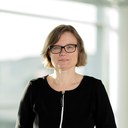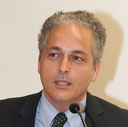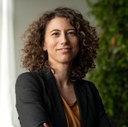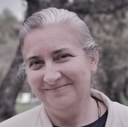The EEA Management Board designated on 24 March 2022 the following members (Chair, followed by members in alphabetical order by last name):
 Ottmar Edenhofer (Chair)
Ottmar Edenhofer (Chair)
Ottmar Edenhofer (German) is a professor of the Climate Economics and Public Policy at the Technische Universität in Berlin (Germany). He is Director and Chief Economist at the Potsdam Institute for Climate Impact Research, as well as Director of the Mercator Research Institute on Global Commons and Climate Change (Germany). From 2008 to 2015, he served as Co-Chair of Working Group III of the IPCC and was lead author of the technical summary and of the summary for policy makers for both the WG III contribution to the IPCC AR5 and the IPCC’s Special Report on Renewable Energy Sources and Climate Change Mitigation.
In 2020, Ottmar Edenhofer was ranked among the 1% of the most cited scientists worldwide in the category "interdisciplinary science" according to the Web of Science citation index. The FAZ placed Ottmar Edenhofer in 2019 and 2020 among the 10 most influential economists in Germany, in 2021 he was ranked on place 15.
Ottmar Edenhofer advises and collaborates in many boards and committees nationally as well as on European and international level, e. g. as a member of the Irish Climate Change Advisory Council or as Co-Chair of the Steering Committee for the “Climate Protection Science Platform” of the German Federal Government.
Professor Edenhofer was elected Chairperson for a period of four years at the Advisory Board meeting held in Copenhagen on 17 May 2022.
 Jette Bredahl Jacobsen (Vice-Chair)
Jette Bredahl Jacobsen (Vice-Chair)
Jette Bredahl Jacobsen (Danish) is a professor in Environmental and Resource Economics at the University of Copenhagen (Denmark). Her current research focuses on carbon sequestration, material substitution, and behavioural change in transportation, as well as the economic assessment of flood risk, and with farmers’ decision-making in relation to climate change.
Jette Bredahl Jacobsen is also deputy chairperson of the Danish Council on Climate Change, where she provides independent scientific advice on the transition to a low-carbon society, taking into account both cost effectiveness and other societal aims. Jette Bredahl Jacobsen is also a scientific expert for the Danish Environmental Economic Council and a member of the board of the Green Reform project (Danish Ministry of Finance).
Jette Bredahl Jacobsen holds a PhD on Forestry Economics from the Royal Veterinary and Agricultural University, Frederiksberg (Denmark).
 Laura Díaz Anadón (Vice-Chair)
Laura Díaz Anadón (Vice-Chair)
Laura Díaz Anadón (Spanish, American) is a Professor of Climate Change Policy and Director of the Centre for Environment, Energy & Natural Resource Governance at the University of Cambridge (United Kingdom). She was recently a visiting scholar at the Harvard Kennedy School of Government of Harvard University, Cambridge (USA) and in 2022 she was awarded a Distinguished Visiting Professorship at Tsinghua University (China). Her research sits at the intersection of climate, energy and innovation policy, with a focus on fiscal and regulatory policy, and on accelerating the development and deployment of novel technologies in the energy sector.
Laura Díaz Anadón is Lead Author for the WG III contribution to the IPCC AR6 (chapter on Innovation, technology development and transfer). She was also a member of the Economics of Decarbonisation Advisory Group for the Net Zero Review undertaken by the United Kingdom’s Government in 2020/2021.
Laura Díaz Anadón holds a PhD in chemical engineering from the University of Cambridge’s Queen’s (United Kingdom).
 Maarten van Aalst
Maarten van Aalst
Maarten van Aalst (Dutch) is a professor on climate and disaster resilience at the University of Twente (Netherlands), and Director of the International Red Cross Red Crescent Climate Centre. He is also Adjoint Senior Research Scientist at the International Research Institute for Climate and Society (IRI), Columbia University (USA) and has acted as Independent Adviser on Climate Risk Management for the World Bank, the African Development Bank, the Interamerican Development Bank, the OECD, UNDP, and for various governments.
Maarten van Aalst is Coordinating Lead Author for the Working Group (WG) II contribution to the IPCC 6th Assessment Report (AR6) (chapter on Key Risks across sectors and regions, Summary for Policy Makers). He was also Coordinating Lead Author for the IPCC Special Report on Extremes and Disasters (chapter on Determinants of Risk, Summary for Policy Makers).
Maarten van Aalst holds a PhD in Atmospheric Science from Utrecht University (Netherlands) and the Max Planck Institute for Chemistry, Mainz (Germany).
 Constantinos Cartalis
Constantinos Cartalis
Constantinos Cartalis (Greek) is a Professor of Environmental and Climate Physics and Director of the Laboratory of Environmental Physics-Meteorology at the National and Kapodistrian University of Athens (Greece). He is a member of the Regional Professorship Program of the Cyprus Institute on Climate and Atmosphere Research. His research focuses on the climate vulnerability of sectors such as cities, tourism, forests and the natural environment, on climate change adaptation at the regional and urban level, as well as the impacts of climate change on cultural heritage.
Constantinos Cartalis has served as Chairman of the Environment Committee of the Parliament of Greece and as a member of the Mission Assembly of the European Commission for Climate Neutral Cities. He has also served as a member of the Executive Bureau of the Subsidiary Body of UNFCCC for the implementation of the Paris Agreement.
Constantinos Cartalis holds a PhD in Atmospheric Science from the University of Michigan, Ann Arbor (USA).
 Suraje Dessai
Suraje Dessai
Suraje Dessai (Portuguese, British) is Professor of Climate Change adaptation at the University of Leeds (United Kingdom). His interdisciplinary research lays at the interface between climate science and decision science, particularly on decision making under deep uncertainty, perception of climate risks and the science-policy interface in climate change impacts, adaptation and services.
Suraje Dessai was Lead Author for the WG I contribution to the IPCC AR6 (chapter on Climate change information for regional impact and for risk assessment), as well as Lead Author for the WG II contribution to the IPCC AR5 (chapter on Foundations for decision making). In 2021, he was ranked 120 in the Reuters list of the world’s top climate scientists. He has advised the United Kingdom and Portuguese governments and the OECD.
Suraje Dessai holds a PhD in Environmental Science from the University of East Anglia (United Kingdom).
 Vera Eory
Vera Eory
Vera Eory (Hungarian, British) is a Climate Change Researcher in Scotland’s Rural College (United Kingdom). She conducts interdisciplinary research to improve the sustainability of agricultural production, with a particular focus on farm and policy aspects of greenhouse gas mitigation.
Vera Eory has over ten years of experience in the economic and environmental implications of greenhouse gas reduction practices in agriculture, including the cost-effectiveness of mitigation practices, environmental co-effects, farmers’ perceptions and the development of policy instruments. She has been a member in various advisory groups, e.g. the UK Government’s Nutrient Management Expert Group and the EIP-AGRI Focus Group on Nutrient Recycling.
Vera Eory holds a PhD in Climate Change Economics from the University of Edinburgh (Scotland).
 Edgar Hertwich
Edgar Hertwich
Edgar Hertwich (Austrian) is a professor of industrial ecology at the Norwegian University of Science and Technology in Trondheim (Norway). His research focuses on climate change mitigation, seeking to understand the opportunities for mitigation addressing technologies, consumption, and economic structure, as well as understanding resource use, as well as environmental and economic impacts of mitigation strategies.
Edgar Hertwich was Lead Author for the WG III contribution to the IPCC AR5 (chapter on Energy Systems) and contributed to the technical summary and summary for policy makers. In 2021, he was ranked 71st in the Reuters list of the world’s top climate scientists. He is also a member of UNEP’s International Resource Panel.
Edgar Hertwich holds a PhD in Energy and Resources from the University of California, Berkeley (USA).

Lena Kitzing
Lena Kitzing (Danish, German) is an Associate Professor and Head of the ‘Society, Market and Policy’ section of the Wind Energy Department at the Technical University of Denmark.
Lena Kitzing is also external lecturer at the University of Flensburg (Germany). Her research spans across the energy-economy-society nexus and especially concerns the effective governance of energy systems through policy instruments, with particular focus on deployment of renewables and their integration into energy system. She is a Board Member of the Joint Programme for wind energy of the European Energy Research Alliance.
Lena Kitzing holds a PhD in Energy Economics from the Technical University of Denmark.
 Elena López-Gunn
Elena López-Gunn
Elena López-Gunn (Spanish, British) is the Founder and Director of ICATALIST, a research company specialized in climate change adaptation and sustainability. She is also president of the international association BRIGAID Connect, building on the EU-funded BRIGAID project, aiming to accelerate the uptake of adaptation solutions and to support communities of innovation for adaptation to climate change.
Elena Lopez-Gunn has contributed to the latest national climate change impact study and is an expert in the Citizen Climate Assembly in Spain. Until 2017, Elena López-Gunn was a Cheney Fellow at the University of Leeds (United Kingdom). She was an Associate Professor at IE Business school, Madrid (Spain), a Senior Fellow at the Botin Foundation Water Observatory and a Fellow at the London School of Economics (United Kingdom).Elena Lopez-Gunn is Lead Author for the WG II contribution to the IPCC AR6 (chapter on Water).
Elena Lopez-Gunn holds a PhD in Geography from King's College, London (United Kingdom).
 Lars J. Nilsson
Lars J. Nilsson
Lars J. Nilsson (Swedish) is a Professor of Environmental and Energy Systems Studies and Head of the Department of Technology and Society at Lund University (Sweden). His research focuses on industrial decarbonisation and co-evolution with energy system transitions in the perspective of circular economy, electrification, industrial development and climate policy strategies.
Lars J. Nilsson is Coordinating Lead Author for the WG III contribution to the IPCC AR6 (chapter11 on Industry) and was Lead Author for the IPCC Special Report on Renewable Energy Sources and Climate Change Mitigation (chapter8 on Integration of Renewable Energy into Present and Future Energy Systems, Summary for Policy Makers and Technical Summary). He is also member of the International Advisory Council to the Wuppertal Institute and the Advisory Committee to the Initiative for Climate Action Transparency.
Lars J. Nilsson holds a PhD in environmental and energy systems analysis.

Keywan Riahi
Keywan Riahi (Austrian) is the Director of the Program on Energy, Climate, and Environment at the International Institute for Applied Systems Analysis (IIASA), Laxenburg (Austria). He is also visiting professor at the Graz University of Technology (Austria).
Keywan Riahi's main research interests are long-term patterns of technological change and economic development, particularly evolution of the energy system. Keywan Riahi was coordinating lead author for the WG III contribution to the IPCC AR6 (chapter on mitigation pathways compatible with long-term goals) and he has served as lead author and review editor to various international assessments, including the Third, Fourth, and Fifth Assessment Reports, the IPCC Special Report on Emissions Scenarios, the IPCC Special Report on CO2 Capture and Storage, and the IPCC Special Report on Renewable Energy. In 2021, Keywan Riahi was appointed to the 10-Member Group by the United Nations Secretary-General Guterres to advise on Science, Technology and Innovation for the implementation of the Agenda 2030 and the same year Reuters ranked him as the most influential climate scientist in the world.
Keywan Riahi holds a Doctorate degree in Mechanical Engineering and Industrial Management from Graz University of Technology (Austria).
 Joeri Rogelj
Joeri Rogelj
Joeri Rogelj (Belgian) is the Director of Research at the Grantham Institute of the Imperial College London (United Kingdom), and a Senior Research Scholar at the International Institute for Applied Systems Analysis (IIASA), Laxenburg (Austria). His research explores how societies can transform towards sustainable futures by connecting Earth system sciences to the study of societal change and policy and has published on the effectiveness of international climate change agreements, carbon budgets, net zero targets, deep decarbonisation (1.5°C) pathways, and interactions between climate and sustainable development.
Joeri Rogelj was Lead Author in the WG I contribution to the IPCC AR6 (chapter on Global carbon and other biogeochemical cycles and feedbacks) and Coordinating Lead Author of the IPCC Special Report on Global Warming of 1.5 °C (chapter on Mitigation pathways compatible with 1.5°C in the context of sustainable development). He is Lead Author on annual science synthesis reports by the UN Environment Programme. In 2021, he was ranked by Reuters 31st in the list of the top 1000 world climate scientists.
Joeri Rogelj holds a Doctoral degree from the Swiss Federal Institute of Technology in Zürich.

Nicolaas Schrijver
Nicolaas Schrijver (Dutch) is a State Councillor in the Netherlands, Professor emeritus of Public International Law, Leiden University (Netherlands), and a member of the Special Standing Committee on Climate Policy, mandated under the Dutch Climate Law of 2018 to provide an annual independent assessment of the Dutch climate policy.
Nicolaas Schrijver is also Professor of European Union and Cooperation with developing countries at the Université Libre de Bruxelles (Belgium), member and former President of the Institut de Droit International, where he currently serves as one of the two Rapporteurs on Harm Prevention Rules to the Global Commons, which includes the climate system.
Nicolaas Schrijver holds a Doctoral Degree of Law from Rijksuniversiteit Groningen (Netherlands) and is the author of various books on international law and sustainable development.
 Jean-Francois Soussana
Jean-Francois Soussana
Jean-Francois Soussana (French) is a Research Director, Vice-President for international policy and executive board member at the French National Research Institute for Agriculture, Food and the Environment. He is also a member of the French High Council on Climate, which provides independent advice and recommendations to the French government on the delivery of national climate policies.
Jean-Francois Soussana was a member of the Mission Board on Soil Health and Food for the European Commission. He contributed to several IPCC reports as a lead author, for example the WG II contribution to the IPCC AR5 (chapter on Europe) and the IPCC Special Report on Climate Change and Land (chapter on Interlinkages between desertification, land degradation, food security and GHG fluxes).
Jean-Francois Soussana holds a PhD in plant physiology from the University of Montpellier (France).
 Ottmar Edenhofer (Chair)
Ottmar Edenhofer (Chair) Jette Bredahl Jacobsen (Vice-Chair)
Jette Bredahl Jacobsen (Vice-Chair) Laura Díaz Anadón (Vice-Chair)
Laura Díaz Anadón (Vice-Chair) Maarten van Aalst
Maarten van Aalst Constantinos Cartalis
Constantinos Cartalis Suraje Dessai
Suraje Dessai Vera Eory
Vera Eory Edgar Hertwich
Edgar Hertwich
 Elena López-Gunn
Elena López-Gunn Lars J. Nilsson
Lars J. Nilsson
 Joeri Rogelj
Joeri Rogelj
 Jean-Francois Soussana
Jean-Francois Soussana
Document Actions
Share with others